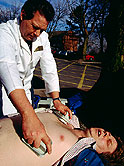
MONDAY, June 20 (HealthDay News) — Cardiac arrest victims are more likely to survive if rescuers take a shorter pause in CPR before and after using a defibrillator to deliver an electric shock to the heart, a new study finds.
Researchers analyzed the cases of 815 American and Canadian patients who suffered sudden cardiac arrest and were treated by emergency medical service (EMS) paramedics using either an automated external defibrillator or a manual defibrillator.
The likelihood of surviving until hospital discharge was much lower for patients whose rescuers paused CPR for 20 seconds or more before delivering a shock (pre-shock pause), and for patients whose rescuers paused CPR before and after defibrillation (peri-shock pause) for 40 seconds or more, compared to patients with a pre-shock pause of less than 10 seconds and a peri-shock pause of less than 20 seconds, according to the findings published June 20 in the journal Circulation.
“We found that if the interval between ending CPR and delivering a shock was over 20 seconds, the chance of a patient surviving was 53 percent less than if that interval was less than 10 seconds,” principal investigator Dr. Sheldon Cheskes, an assistant professor of emergency medicine at the University of Toronto, said in a news release from the American Heart Association.
“Interestingly, there was no significant association between the time from delivering a shock to restarting CPR, known as the post-shock pause, and survival to discharge. This led us to believe that a primary driver for survival was related to the pre-shock pause interval.”
In addition, patients with peri-shock pauses of more than 40 seconds were 45 percent less likely to survive than those with peri-shock pauses of less than 20 seconds, the investigators found.
Each year in the United States, EMS responders treat nearly 300,000 cardiac arrest cases that occur in locations other than hospitals. Less than 8 percent of those patients survive, according to the study.
More information
The U.S. National Heart, Lung, and Blood Institute has more about cardiac arrest.

